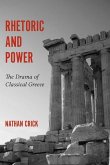""Just keep your spirits up, attitude is everything!" "You'll get through this-you're a fighter!" "Were they able to catch it early?" "Have you ever been a smoker?" These phrases commonly directed at people with cancer, though well-intentioned, rhetorically reflect an American ideal of power and resiliency. In "War, Positivity, and Prevention: Eugenic Reverberations in 20th-Century U.S. Cancer Rhetorics," Lois Agnew illustrates how the tension between the need to acknowledge the real danger of cancer and the American insistence upon confidence and control lies at the heart of cancer rhetoric. Agnew conducts a rhetorical history focused on prominent lines of argument about cancer-or cancer topoi--in the 20th century, drawing on theories of disability studies and identifying the subtle presence of eugenic visions of society found in cancer topoi. From the growing prominence of cancer research centers in the 1920s and 1930s, cancer began to shift from a private matter to a public concern, making cancer visible and supporting the goal of early detection and treatment. At the same time, the cancer advocacy groups that formed during this period were historically situated within and influenced by the flourishing of eugenic ideologies. Agnew traces the presence of these influences in the development of cancer arguments, finding their roots within a dominant rhetorical framework focused on eliminating imperfection, promoting progress, maintaining control, and protecting civic fitness and productivity. Each of the dominant cancer topoi crystallizes for an anxious public the idealized qualities possessed by a people prepared to respond to the threat: strong and determined against the enemy, capable of resisting the effects of cancer through a positive outlook, and equipped to protect themselves against cancer through vigilance. After tracing the emergence of cancer publicity in the early decades of the twentieth century, Agnew discusses the complex factors that shape the emphasis on war as a metaphor relevant to government policy, medical research, and personal experience. Agnew then looks at the evolution of cancer's perceived connection with melancholy in modern topoi that urge cancer patients to seize control of their disease through a positive outlook. Next, Agnew explores how the goal of prevention generated new ways of talking about cancer that have problematic implications alongside the potential benefits associated with public awareness. Finally, Agnew concludes by acknowledging the material stories of cancer patients, illustrating that their multiplicity of experiences cannot be easily assimilated into a eugenic vision of idealized qualities encouraged by the cancer topos. For scholars of rhetoric, rhetorical history, and disability studies, Agnew's attention to the rhetorical construction of cancer provides a path to a deeper understanding of what disease and disability mean in our society and how language reflects and structures our reality"--
Hinweis: Dieser Artikel kann nur an eine deutsche Lieferadresse ausgeliefert werden.
Hinweis: Dieser Artikel kann nur an eine deutsche Lieferadresse ausgeliefert werden.








